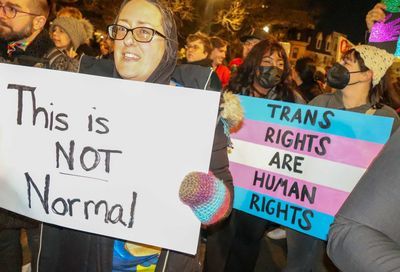Alabama lawmakers vote to criminalize gender-affirming health care for transgender youth
Bill also forces school administrators to "out" students struggling with their gender identity to their parents

Alabama lawmakers are poised to approve a bill that would bar transgender youth under the age of 19 from accessing gender-affirming care, and would make it a felony for any doctor or medical provider to recommend such care.
Under the bill, approved 23-4 by the Senate last week, doctors who prescribe puberty blockers, hormone therapy, or surgery in order to treat gender dysphoria could face up to 10 years in prison or a $15,000 fine. Those extreme punishments will have the effect of intimidating doctors and forcing them to refuse to treat transgender people or ignore a patient’s gender dysphoria to ensure they don’t run afoul of the law.
The bill now heads to the Alabama House of Representatives, which has passed its own version of the bill. Once the House approves the Senate version of the legislation, as expected, the bill will head to the desk of Gov. Kay Ivey (R), who is likely to sign it into law.
The bill also contains a controversial provision that requires all school officials to disclose to a student’s parents if they know a student is struggling with their gender identity or gender dysphoria.
As a result, administrators will be forced to “out” such students as transgender, even if they are not ready to disclose their gender identity to their parents, and even if the student is likely to face physical or emotional harm at the hands of their parents or guardians for gender-nonconformity.
Sen. Shay Shelnutt (R-Trussville), the sponsor of the Senate version of the bill, said he proposed the bill to “protect children.” Many proponents of the ban on gender-affirming care echo right-wing talking points that gender dysphoria is a phase, that puberty blockers have harmful and irreversible effects on transgender youth, such as sterility, and that many people who ultimately transition genders grow to regret their choice in later years.
“I don’t think the same way I did at 14 when I was 25,” Shelnutt told the Montgomery Advertiser. “You know the male brain — I don’t know when it fully mature[s], but you know, the human brain is not fully mature and you know they are going to think differently.”
He also maintained that, even though he does not know of any surgical interventions actually taking place in Alabama on minors, the best way to prevent surgery from ever being performed on a minor is to move forward with a total ban on gender-affirming care.
In passing their own version, the Alabama House of Representatives added an amendment that would clarify that psychologists are not prohibited from providing counseling to youth suffering from gender dysphoria. A similar amendment was offered in the Senate, but ultimately defeated.
Related: Alabama cop, father of trans woman, tells lawmakers not to ban health care for trans youth
While similar bills have been introduced in various legislatures throughout the country, Alabama is the first state to pass a bill that would directly interfere with a transgender youth’s medical decisions — even in cases where they have the support and blessing of their parents.
LGBTQ advocates argue that such bills are simply a political-messaging tool, and that lawmakers either do not understand, or knowingly refuse to acknowledge, the nuanced and deliberative process that a person goes through when transitioning. They also warn that passage of the bill will eventually result in lawsuits challenging its constitutionality.
The American Civil Liberties Union of Alabama said in a statement that the bill “runs counter to medical science, prevailing standards of treatment for transgender youth, and basic human dignity.”
Allison Scott, the director of impact and innovation for the Campaign for Southern Equality, told the Advertiser that any bill, especially Shelnutt’s version, would endanger transgender children.
“Under this bill, they can’t go to their doctor for help, and they can’t seek counsel or comfort from their teachers or school staff,” Scott said. “If their parents reject them for their gender identity, where are they supposed to go?”

The Human Rights Campaign and the Southern Poverty Law Center also issued statements condemning the bill.
“Denying medical services to transgender people is wildly unpopular across all political persuasions,” Carmarion Anderson-Harvey, the Human Rights Campaign Alabama state director, said. “Transgender youth suffer heightened levels of anxiety, dysphoria, depression, and suicide. Refusing them medically necessary care only increases that risk and creates a culture of discrimination.
“Transgender people, especially transgender people of color, have faced an epidemic of fatal violence that reached a fever pitch last year,” added Anderson-Harvey. “Rather than acting to roll back rights for transgender individuals and deny them the care they need, Alabama legislators should commit to policies that include transgender people. More acutely, they should focus on the problems Alabamians face in the midst of a global pandemic and its economic repercussions.”
Scott McCoy, the interim deputy director of LGBTQ rights and special litigation at the Southern Poverty Law Center, warned that the bill would likely lead to “long and expensive litigation” that ultimately costs Alabama taxpayers money when the law is ultimately declared unconstitutional.
“This bill is harmful for several reasons. First, it would remove control of vital health care decisions from transgender youth, their families and their doctors and inserts government where it doesn’t belong,” McCoy said. “Second, it would expose medical professionals who treat transgender youth to criminal sanctions. Third, it would put educators and school personnel in a legal and ethical conflict by requiring them to out transgender students to hostile parents.
“The Alabama legislature should be getting families back to work, equipping medical professionals to pull us out of this pandemic, and opening schools — not attacking transgender youth and anyone who supports them,” McCoy concluded. “We continue to urge the Alabama legislature to stop targeting transgender people, especially transgender youth, and get back to the real work of helping everyday Alabamians.”
Read more:
Utah Republican rants that leftists ‘won’t be happy until we are all bisexual’
Barack Obama joked about Pete Buttigieg being “gay” and “short” new book claims
Transgender lawmakers condemn Tuberville Amendment, urge passage of Equality Act
Support Metro Weekly’s Journalism
These are challenging times for news organizations. And yet it’s crucial we stay active and provide vital resources and information to both our local readers and the world. So won’t you please take a moment and consider supporting Metro Weekly with a membership? For as little as $5 a month, you can help ensure Metro Weekly magazine and MetroWeekly.com remain free, viable resources as we provide the best, most diverse, culturally-resonant LGBTQ coverage in both the D.C. region and around the world. Memberships come with exclusive perks and discounts, your own personal digital delivery of each week’s magazine (and an archive), access to our Member's Lounge when it launches this fall, and exclusive members-only items like Metro Weekly Membership Mugs and Tote Bags! Check out all our membership levels here and please join us today!


























You must be logged in to post a comment.